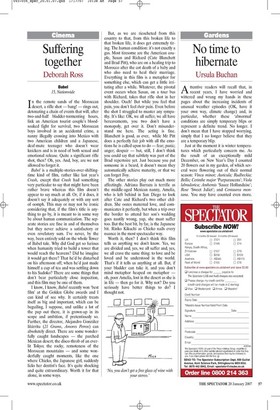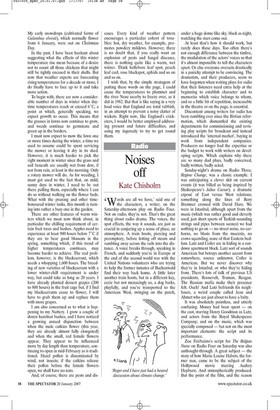No time to hibernate
Ursula Buchan ttentive readers will recall that, in recent years, I have worried and wittered and wrung my hands in these pages about the increasing incidents of unusual weather episodes (OK, have it your own way, climate change) and, in particular, whether these 'abnormal' conditions are simply temporary blips or represent a definite trend. No longer. I don't mean that I have stopped worrying, simply that I no longer believe that they are a temporary blip.
Just at the moment it is winter temperatures which particularly concern me. As the result of an exceptionally mild December, on New Year's Day I counted 20 flowers out in my garden, of which several were flowering out of their normal season: Vinca minor; Attricula; Rudbeckia; Bellis; Cerinthe major Purpurascens'; Viola labradorica; Anthemis 'Sauce Hollandaise'; Rose 'Sweet Juliet'; and Centaurea montana. You may have counted even more.
My early snowdrops (cultivated forms of Galanthus elwesii), which normally flower from 6 January, were out on Christmas Day.
In the past, I have been hesitant about suggesting what the effects of this winter temperature rise mean because of a desire not to count all those chickens that might still be tightly encased in their shells. But now that weather experts are forecasting rising temperatures for a decade or more, I do finally have to face up to it and take more action.
To begin with, there are now a considerable number of days in winter when daytime temperatures reach or exceed 6°C, a point at which, generally speaking, we expect growth to occur. This means that the grasses in lawns now continue to grow, and weeds continue to germinate and green up in the borders.
I must now expect to mow the lawn one or more times during the winter, a time we used to assume could be spent servicing the mower or leaving it dry in its shed. However, it is much harder to pick the right moment in winter since the grass and soil beneath are usually wet from dew, if not from rain, at least in the morning. Only a rotary mower will do. As for weeding, I must get used to the fact that, on mild, sunny days in winter, I need to be out there pulling them, especially where I can do so without walking on the flower beds. What with the pruning and other timehonoured winter tasks, this month is turning into rather a busy one in the garden.
There are other features of warm winters which we must now think about, in particular the chilling requirement of certain fruit trees and bushes. Apples need to experience at least 900 hours below 7°C if they are to bear good blossom in the spring, something which, if this trend of higher temperatures continues, may become harder to achieve. The real problem, however, is the blackcurrant, which needs a whopping 1,600 hours. The breeding of new varieties of blackcurrant with a lower winter-chill requirement is under way, but could take as long as 20 years. I have already planted dessert grapes (200 to 800 hours) in the fruit cage but, if I find my blackcurrants cease to flower, I will have to grub them up and replace them with more grapes.
I am also concerned as to what is happening to my Nuttery. I grow a couple of dozen hazelnut bushes, and I have noticed a growing annual disjunction between when the male catkins flower (this year, they are already almost fully elongated) and when the small, red female flowers appear. They appear to be influenced more by day length than temperature, continuing to open in mid-February as is traditional. Hazel pollen is disseminated by wind, not insects; if the catkins release their pollen before the female flowers open, we shall have no nuts.
And, of course, there are pests and diseases. Every kind of weather pattern encourages a particular cohort of troubles: hot, dry weather, for example, promotes powdery mildews. However, there is no doubt that, if you really want an explosion of pests and fungal diseases, there is nothing quite like a warm, wet winter. Think hellebore leaf spot, peach leaf curl, rose blackspot, aphids and so on and so on.
I wish that, by the simple stratagem of putting these words on the page, I could cause the temperatures to plummet and the river Nene nearby to freeze over, as it did in 1982. But that is like saying in a very loud voice that England are total rubbish, in an attempt to prevent a noisy clatter of wickets. Right now, like England's cricketers, I would be better employed addressing present and future difficulties, and using my ingenuity to try to get round them.






















































 Previous page
Previous page